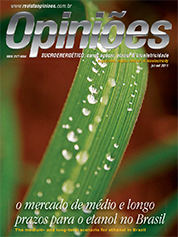Eduardo Pereira de Carvalho
Director of Expressão Comercial, Importadora e Exportadora
Op-AA-29
It is about time one reverted this scenario
What is the outlook for ethanol in Brazil? Never have prices, on average, been so high, whether for anhydrous or hydrated ethanol. Never have sugar prices been consistently as high as in the last year. Never has the outlook for the future, be it for the medium- or the long-term, been so bright.
As concerns sugar, the position is that of absolute lead ranking in exports, even when considering the eventual popping up of India or, nowadays, Thailand, with, give or take, one or two additional million tons. There is nobody other than Brazil’s Center-Southern region that can meet the relevant additional supply needed to face the significant growth in the product’s demand.
With respect to ethanol as fuel, the impressive growth of the Brazilian light vehicle fleet results in far greater optimism: roundabout 2020, potential consumption in the order of 73 billion liters, compared with currently 23 billion, conservatively assuming the use of ethanol in 65% of the fleet, provided its prices are competitive.
Furthermore: the idea that sugarcane ethanol is the only true substitute, in a sustainable manner, of gasoline, is becoming universally accepted. This allows anticipating the huge international demand previously projected for a more distant future. Provided production is competitive. I repeat: competitive.
In the industry’s history, times of stagnation in the supply of the product as occurring today, are rare. In fact, some climate mishaps took place. Were there adverse changes in macroeconomic scenarios? A deterioration in the macro-political environment? Nothing of sorts. Production growth simply stopped. Sugarcane plantations were not renewed and hence, there is an idle industrial capacity of some 120 million tons of sugarcane. New mill projects were put on hold.
Industry assets changed owners, in a broad industrial concentration process. The financial situation improved considerably. New conglomerates. New players. And yet, there is a grey, overcast, atmosphere. There is an uneasy feeling, actually, an ill-feeling. A feeling of incapacity, or lack of will, to face all this fantastic demand. A talk of deaf and mute.
The enormous achievements of the last 35 years cannot be lost. The time to revert this scenario is long overdue. What to do? First, a faithful and sincere dialogue among the main interested parties, sugarcane suppliers, industrialists, fuel distributors, the federal and state governments, consumers (represented by whom?) acknowledging the momentary difficulties and planning future actions to eliminate the current impasse.
Parties that can guarantee the possible supply levels, given the available sugarcane. Parties that avoid distortions and market interventions that worsen the investment climate. Parties that re-establish, in the industry, the prevailing optimism that is to be found in most investments in Brazil.
The dramatic effect of the appreciation of the Real, and the related problem of loss of competitiveness, reflecting in the tremendous increase in investment and production costs, making changes unavoidable. New technologies, new products, improvement of processes, major progress in the betterment of infrastructure.
This is the long list of initiatives that will only be fully implemented when the climate of mutual trust among all parties is re-established. Improvement of the institutional environment, particularly as concerning unacceptable environmental restrictions, or potentially discriminating treatment of land ownership and leasing by foreign investors, who are essential participants to get the new cycle of investments up and running.
A clearly defined fuel policy is needed to set the role ethanol has to play in our energy matrix. It is never too late to recall that oil, as we knew it in the 20th Century, is increasingly ceasing to exist as a primary source of cheap and abundant energy: an increasingly rare product, with all inconveniences of its lack of sustainability.
Ethanol from sugarcane, I repeat, is, of all known renewable fuels today, the only strictly feasible alternative. It is a disturbance factor for the current domestic gasoline price policy, because in being disassociated from international oil prices, it imposes on ethanol unfair competition. In my perception, therein lies the main inhibiting factor for new investments in the industry. So, this situation should necessarily only be a conjunctural one.
One should not perpetuate the imposition on Petrobras of losing 35 cents of a Real on each liter of gasoline sold in the domestic market. Today, this is how big the difference is between domestic and international gasoline prices. This is even truer when this same company Petrobras is looking for all possible available funds needed for the huge investments in oil exploration in the pre-salt offshore layers.
One should also recall that the CIDE – the regulatory tax created on fuel –, is intended as an adequate instrument, precisely for a clear fuel policy. It is unacceptable that with all the external positive factors concerning ethanol, one should lose the fantastic opportunities it provides.




